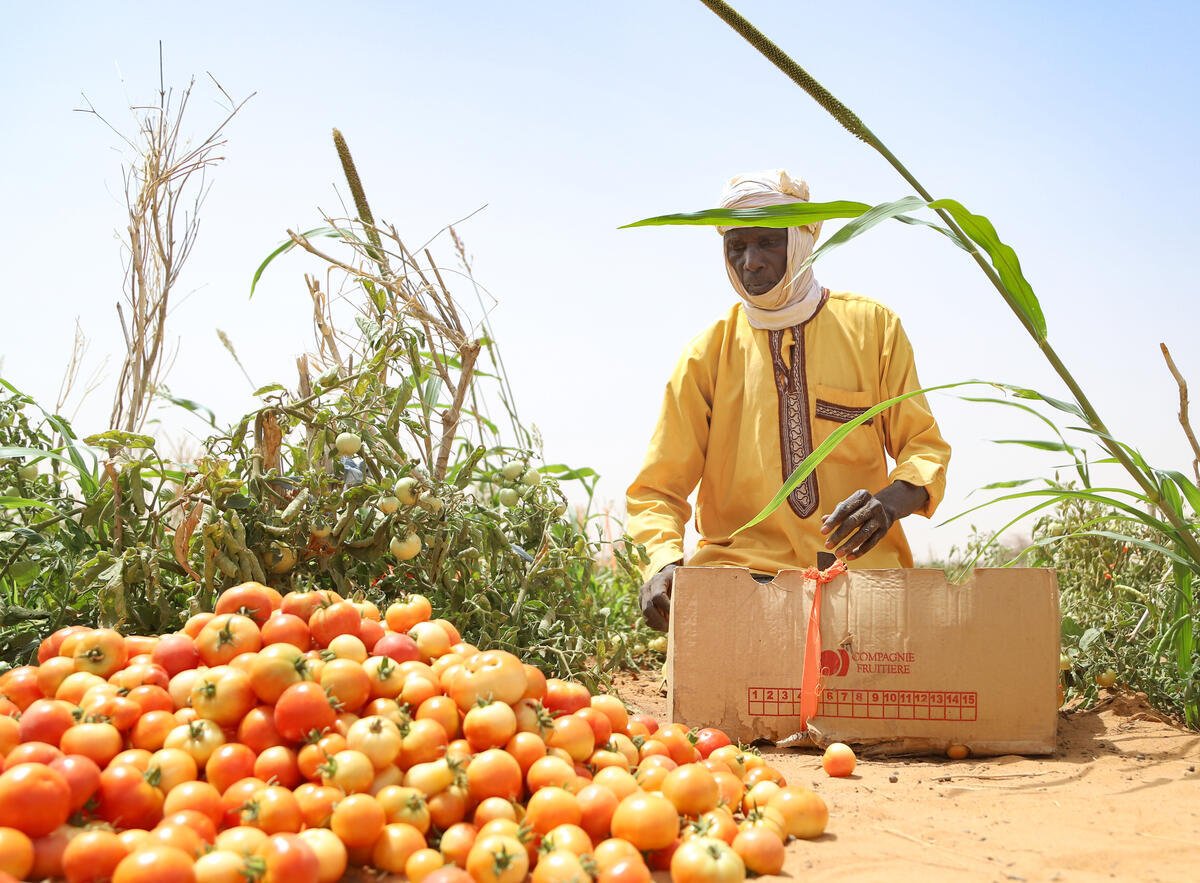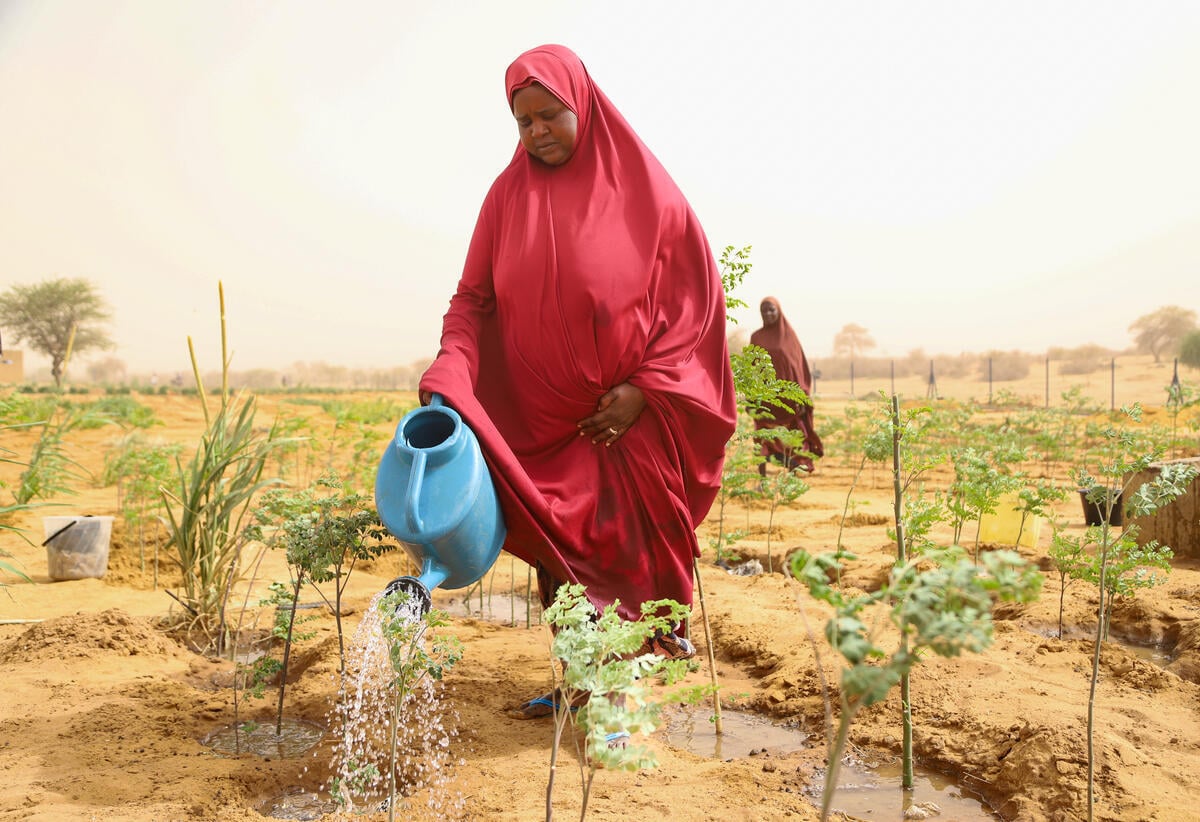Abala's sustainable market garden: refugees, internally displaced people, and host community members grow opportunities and close-knit ties
Abala's sustainable market garden: refugees, internally displaced people, and host community members grow opportunities and close-knit ties

In the middle of a vast, sunbaked expanse in the small southwestern Nigerien town of Abala, in the Tillaberi Region, a patchwork of young, green moringa plants, meticulously aligned, defy the harshness of their environment. Spread across the field are women and men holding watering cans, tenderly nourishing every neat row. Others, tillers in hand, shuffle from one plant to the other, carefully breaking the soil around each shoot. Among them is 41-year-old Fati Moussa, a Malian refugee.
“The work is important,” says Fati, sitting down on the concrete veranda of a storehouse at the garden entrance after completing her work for the day. “I love it because when I wake up in the morning, I have somewhere to go instead of just staying in the house.”
Fati works in a market garden in what was once a camp for Malian refugees but is now known as an urbanised settlement, an effort to move away from the isolated nature of camps towards settlements that encourage the inclusion of refugees in host communities.
When armed groups began attacking her village in Aderamboukane in Mali’s Menaka Region in 2012, Fati was forced to flee, along with her five children. They found safety in the settlement in Abala but remained dependent on humanitarian assistance, like many of the 21,500 refugees living there.
In 2023, UNHCR, the UN Refugee Agency, saw an opportunity to help Fati and other forcibly displaced people earn some income while strengthening ties with the host communities through some livelihood activities planned by the UN World Food Programme, WFP.
“Refugees and IDPs needed livelihoods; UNHCR and WFP worked together to ensure their inclusion in livelihood projects that WFP had planned,” says Joseph Beyongolo, the Head of UNHCR’s field unit in Abala. “It was a good opportunity for us to pool resources together to be more effective in improving the well-being of refugees, IDPs and host communities who have all been affected by humanitarian crises, especially now that humanitarian resources are so stretched.”
Fati was among the 97 refugees that UNHCR and WFP identified to work in the market garden, one of the livelihood projects. The project provides income for 400 families, including 87 internally displaced people and 217 host community members.
“Before, I had nothing to do. Now, many things have changed. There is more money coming into the house. I can plan and buy little things that the children need,” says Fati, the sole breadwinner for her children.
The garden grows moringa plants, tomatoes, green and chilli peppers, onions, and other vegetables. It uses a solar-powered irrigation system to compensate for the region's generally low rainfall. This embodies WFP’s vision of creating efficient, inclusive, sustainable, and resilient food systems driven by clean energy.

© UNHCR/Helen Ngoh
The garden improves nutrition in their households, as about 17 per cent of the yield is consumed at home. The remaining 83 per cent of the vegetables are sold, significantly increasing the diversity of produce available in markets in and around Abala.
“It is an important market opportunity for consumers in the municipality of Abala and the surrounding villages,” says Zayanou Issoufou, the market gardening specialist for the partner NGO overseeing the project, Action Pour le Bien Etre, APBE. “The garden is helping to meet a significant need in terms of the supply of fruits and vegetables in this arid area. It even supplies vegetables as far away as Niamey, especially the melons and tomatoes, at more affordable prices.”
Beyond market gardening, communities are also involved in various interventions, including land restoration, school feeding, nutrition, and income generation. These activities provide opportunities for local people to connect, build relationships, and learn to coexist peacefully. They enhance social cohesion within communities, build their resilience, and reduce dependence on humanitarian assistance.
"These communities can now meet and work together, and their livelihoods have improved," says Abdoulaye Sarr, Head of the WFP Niamey Sub-Office for the Tillabéri and Dosso regions. "Our joint efforts aim to reduce the need for humanitarian assistance and to build a society where peaceful coexistence is a reality.”
“Once you enter this garden, you become family,” says Sani Darwa, a 42-year-old Nigerien man, while harvesting a tomato patch. "When we work together like this, there is solidarity, and we learn how to live together. We help each other, and we see the result."
“In Abala, we’re cultivating more than just crops,” says Beyongolo. “We’re nurturing collaboration and partnerships. The involvement of refugees, internally displaced people, and the local community in this and other initiatives is a good example of community engagement that values members of different communities as equal partners. This involvement ensures that the opinions of all the communities are heard and used to design, guide, and, if necessary, readjust the project on the ground.”
Greater support would enable these communities to thrive, improve living conditions, and become more resilient and self-sufficient. They are eager for the tools and resources to enhance their efforts and expand their initiatives. The success of this and other projects generates expectations within communities, and they need to be implemented over a more extended period to guarantee sustainable results and ensure greater participation of the various communities involved.
“We need more work materials for the garden, especially a method of transport, like a chariot pulled by donkeys and cows,” says Fati, who would like to see the experience in Abala replicated elsewhere.
“Here, we live in perfect harmony. We have a common purpose. I want this project to happen in other villages because it benefits everybody, whether they are refugees or not.”








